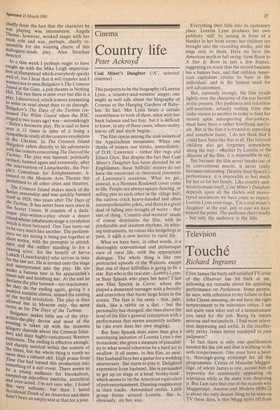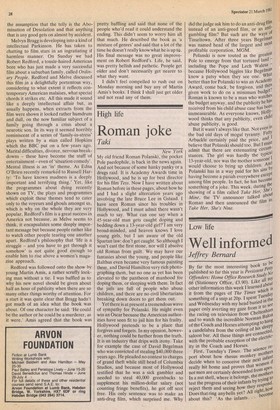Television
Touché
Richard In grams Clive James the burly self-satisfied TV critic of the Observer has hit back at me, following my remarks about his appalling performance on Parkinson. Some people, he says, with reference to my failure to find John Cleese amusing, do not have the right temperament to be television critics. I am not quite sure what sort of a temperament you need for the job. Being by nature morose and melancholy, I find most television depressing and awful. Is the insufferably perky James better equipped to pass judgment?
In fact there is only one qualification needed for the job and that is nothing to do with temperament, One must have a hearty, thorough-going contempt for all the programmes. Critics of Malcolm Muggeridge, of whom 'James is one, accuse him of hypocrisy .for continually appearing on television while at the same time despising it. But I am sure that one of the reasons why Muggeridge, Ancient and Modern (BBC2) is about the only decent thing to be seen on TV these days, is that Mugg starts off from the assumption that the telly is the Abomination of Desolation and that anything that is any good gets on almost by accident. Melvyn Bragg is developing into a kind of intellectual Parkinson. He has taken to chatting to film, stars in an ingratiating if harmless manner. On Sunday we had Robert Redford, a tousle-haired American bore who has just made a very successful film about a suburban family, called Ordinary People. Redford and Melve discussed this film in a delightfully portentous way, considering to what extent it reflects contemporary American malaises, what special chords it strikes etc. All this made it sound like a deeply intellectual affair but, as usually happens, when extracts from the film were shown it looked rather humdrum and dull, on the now familiar subject of a family going through a crisis about a neurotic son. In its way it seemed horribly reminiscent of a series. of 'family-in-stress' plays written by a man called Hopkins which the BBC put on a few years ago.
Marital difficulties, divorce, nervous break downs these have become the stuff of entertainment even of 'situation comedy'.
Mental illness is an in' theme. As Edna O'Brien recently remarked to Russell Harty: 'To have known madness is a deeply important and terrifying thing.' Yet, like the programmes about dying recently shown on TV, the plays and programmes which exploit these themes tend to cater only to the voyeurs and ghouls amongst us, which is why on the whole they are very popular. Redford's film is a great success in America not because, as Melve seems to think, it encapsulates some deeply impor tant message but because people rather like to watch other people tearing one another apart. Redford's philosophy that 'life is a struggle and you have to get through it somehow' is not quite good enough to enable him to rise above a women's magazine approach.
Redford was followed onto the show by young Martin Amis, a rather scruffy looking man without a tie. 1 was baffled as to why his new novel should be given about half an hour of publicity when there are so many other things worthy of attention. For a start it was quite clear that Bragg hadn't got much of an idea what the book was about. Of one character he said: 'He could be the author or he could be a murderer, as it were.' Amis agreed that the book was pretty baffling and said that none of the people who'd read it could understand the ending. This didn't seem to worry him all that much. He described the book as 'a mixture of genres' and said that a lot of the time he doesn't really know what he is up to. His final message was no great improvement on Robert Redford's. Life, he said, was pretty hellish and pathetic. People get older and don't necessarily get nearer to what they want.
1 didn't feel compelled to rush out on Monday morning and boy any of Martin Amis's books. I think I shall just get older and not read any of them.







































 Previous page
Previous page